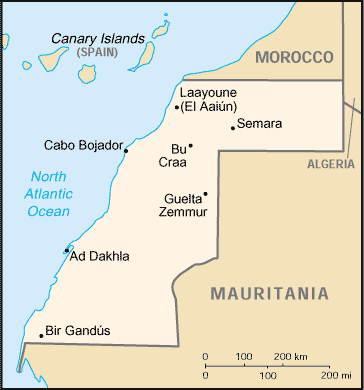Map:

Overview:
Morocco virtually annexed the northern two-thirds of Western Sahara (formerly Spanish Sahara) in 1976, and the rest of the territory in 1979, following Mauritania's withdrawal. A guerrilla war with the Polisario Front contesting Rabat's sovereignty ended in a 1991 UN-brokered cease-fire; a UN-organized referendum on final status has been repeatedly postponed.
The People:
Population: 273,008 (July 2005 est.)
Economy - overview: Western Sahara depends on pastoral nomadism, fishing, and phosphate mining as the principal sources of income for the population. The territory lacks sufficient rainfall for sustainable agricultural production, and most of the food for the urban population must be imported. All trade and other economic activities are controlled by the Moroccan Government. Moroccan energy interests in 2001 signed contracts to explore for oil off the coast of Western Sahara, which has angered the Polisario. Incomes and standards of living in Western Sahara are substantially below the Moroccan level.
Religions:
Muslim
Government Type:
legal status of territory and issue of sovereignty unresolved; territory contested by Morocco and Polisario Front (Popular Front for the Liberation of the Saguia el Hamra and Rio de Oro), which in February 1976 formally proclaimed a government-in-exile of the Sahrawi Arab Democratic Republic (SADR), led by President Mohamed ABDELAZIZ; territory partitioned between Morocco and Mauritania in April 1976, with Morocco acquiring northern two-thirds; Mauritania, under pressure from Polisario guerrillas, abandoned all claims to its portion in August 1979; Morocco moved to occupy that sector shortly thereafter and has since asserted administrative control; the Polisario's government-in-exile was seated as an OAU member in 1984; guerrilla activities continued sporadically, until a UN-monitored cease-fire was implemented 6 September 1991
Leader(s) to pray for:
none
Source: The World Factbook
View All Countries